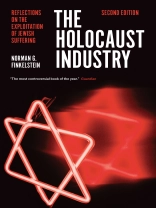In his iconoclastic and controversial study, Norman G. Finkelstein moves from an interrogation of the place the Holocaust has come to occupy in global culture to a disturbing examination of Holocaust compensation settlements. It was not until the Arab-Israeli War of 1967, when Israel’s evident strength brought it into line with US foreign policy, that memory of the Holocaust began to acquire the exceptional prominence it has today.
Recalling Holocaust fraudsters such as Jerzy Kosinski and Binjamin Wilkomirski, as well as the demagogic constructions of writers like Daniel Goldhagen, Finkelstein contends that the main danger posed to the memory of Nazism’s victims comes from some of the very people who profess most passionately to defend it. Drawing on a wealth of untapped sources, he exposes the double shakedown of European countries and legitimate Jewish claimants, and concludes that the Holocaust industry has become an outright extortion racket
About the author
Norman G. Finkelstein taught political theory and the Israel-Palestine conflict for many years. He is the author of eight books, which have been translated into more than forty foreign editions, including What Gandhi Says; This Time We Went Too Far; Beyond Chutzpah; and Image and Reality of the Israel-Palestine Conflict.












